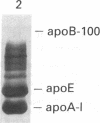Abstract
Deficiency of the cholesteryl ester transfer protein (CETP) in humans is characterized by markedly elevated plasma concentrations of HDL cholesterol and apoA-I. To assess the metabolism of HDL apolipoproteins in CETP deficiency, in vivo apolipoprotein kinetic studies were performed using endogenous and exogenous labeling techniques in two unrelated homozygotes with CETP deficiency, one heterozygote, and four control subjects. All study subjects were administered 13C6-labeled phenylalanine by primed constant infusion for up to 16 h. The fractional synthetic rates (FSRs) of apoA-I in two homozygotes with CETP deficiency (0.135, 0.134/d) were found to be significantly lower than those in controls (0.196 +/- 0.041/d, P < 0.01). Delayed apoA-I catabolism was confirmed by an exogenous radiotracer study in one CETP-deficient homozygote, in whom the fractional catabolic rate of 125I-apoA-I was 0.139/d (normal 0.216 +/- 0.018/d). The FSRs of apoA-II were also significantly lower in the homozygous CETP-deficient subjects (0.104, 0.112/d) than in the controls (0.170 +/- 0.023/d, P < 0.01). The production rates of apoA-I and apoA-II were normal in both homozygous CETP-deficient subjects. The turnover of apoA-I and apoA-II was substantially slower in both HDL2 and HDL3 in the CETP-deficient homozygotes than in controls. The kinetics of apoA-I and apoA-II in the CETP-deficient heterozygote were not different from those in controls. These data establish that homozygous CETP deficiency causes markedly delayed catabolism of apoA-I and apoA-II without affecting the production rates of these apolipoproteins.
Full text
PDF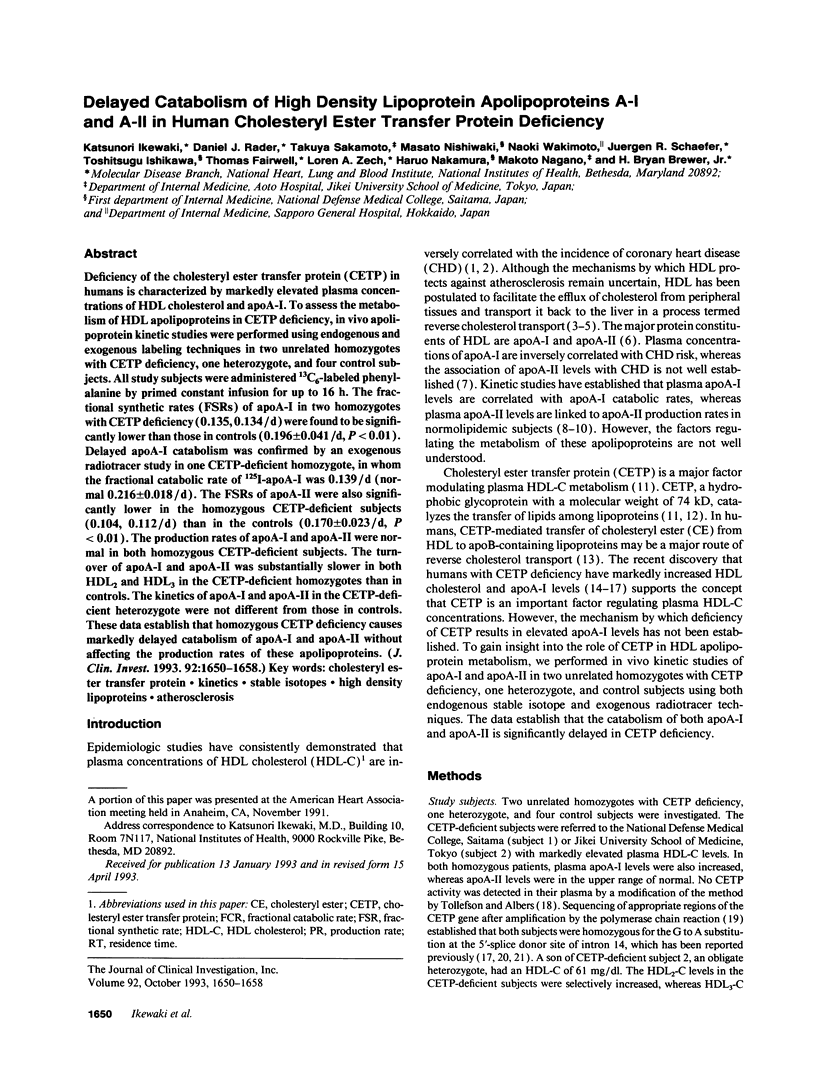
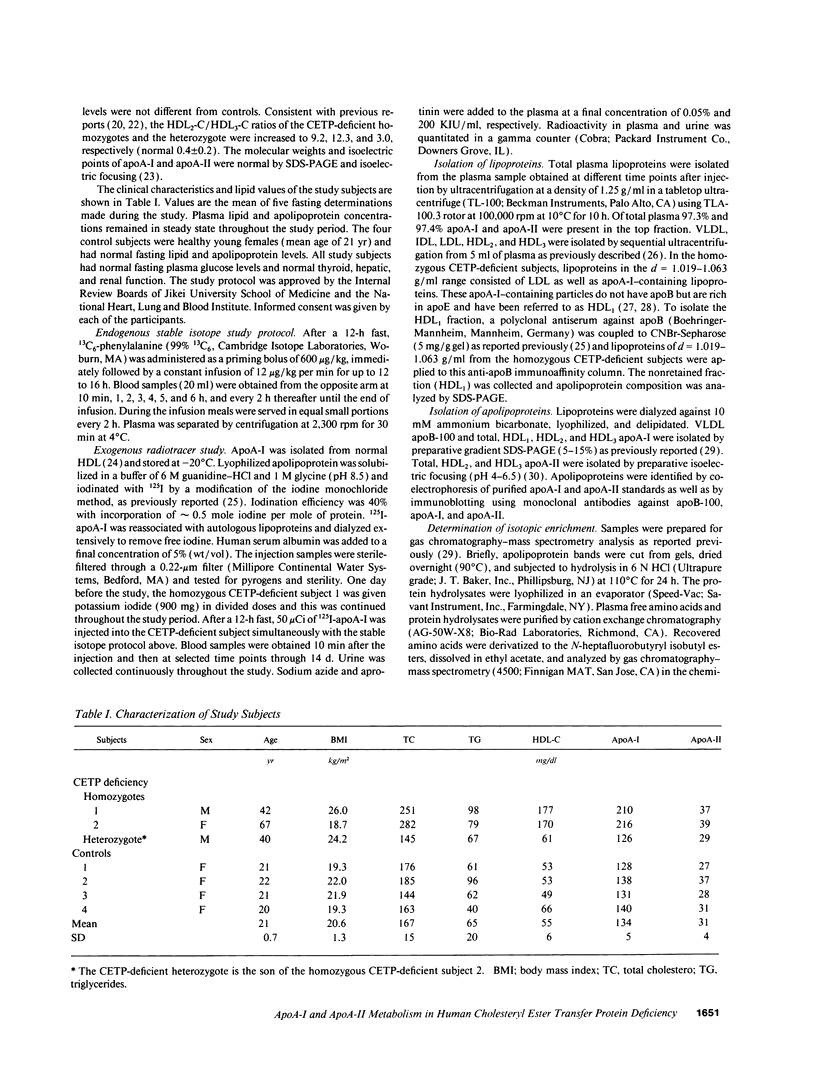
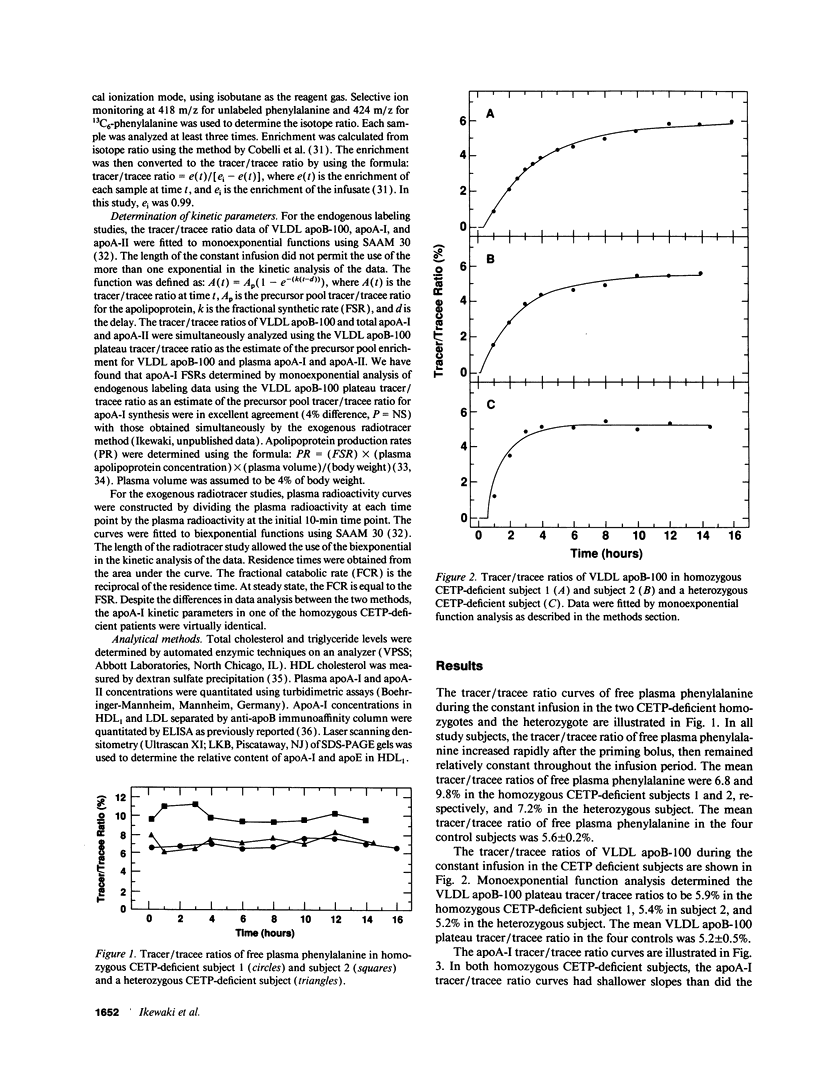
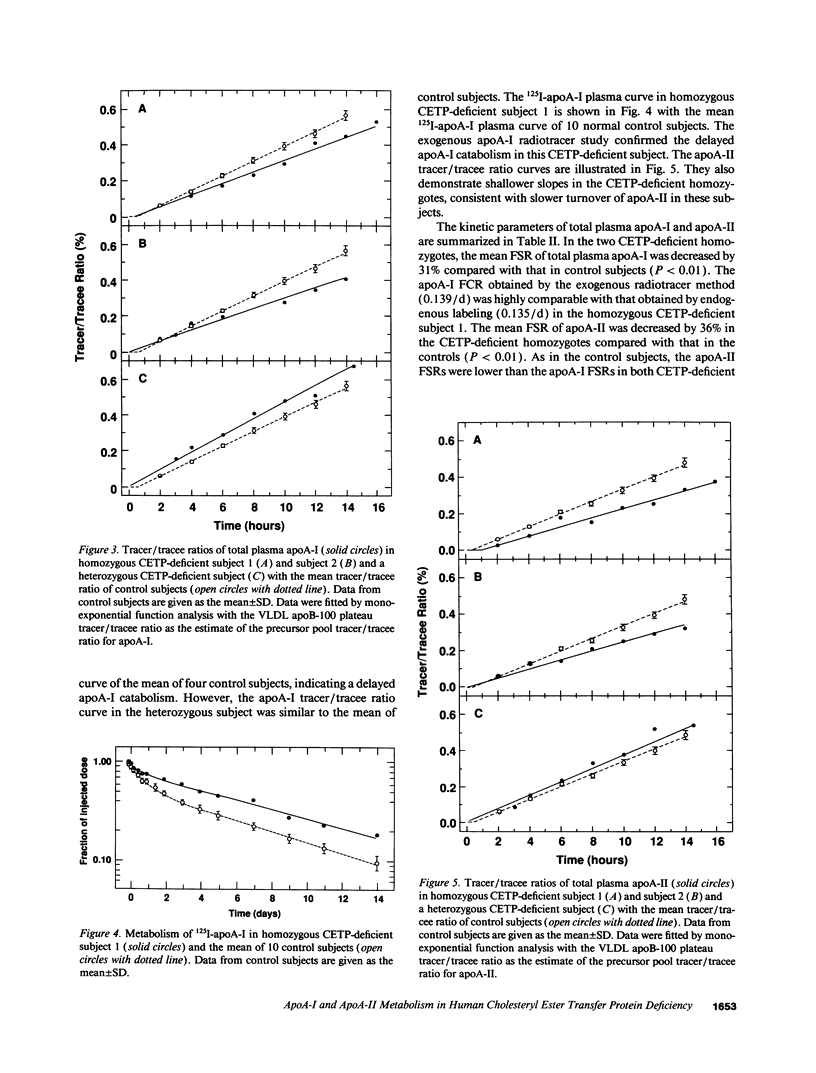
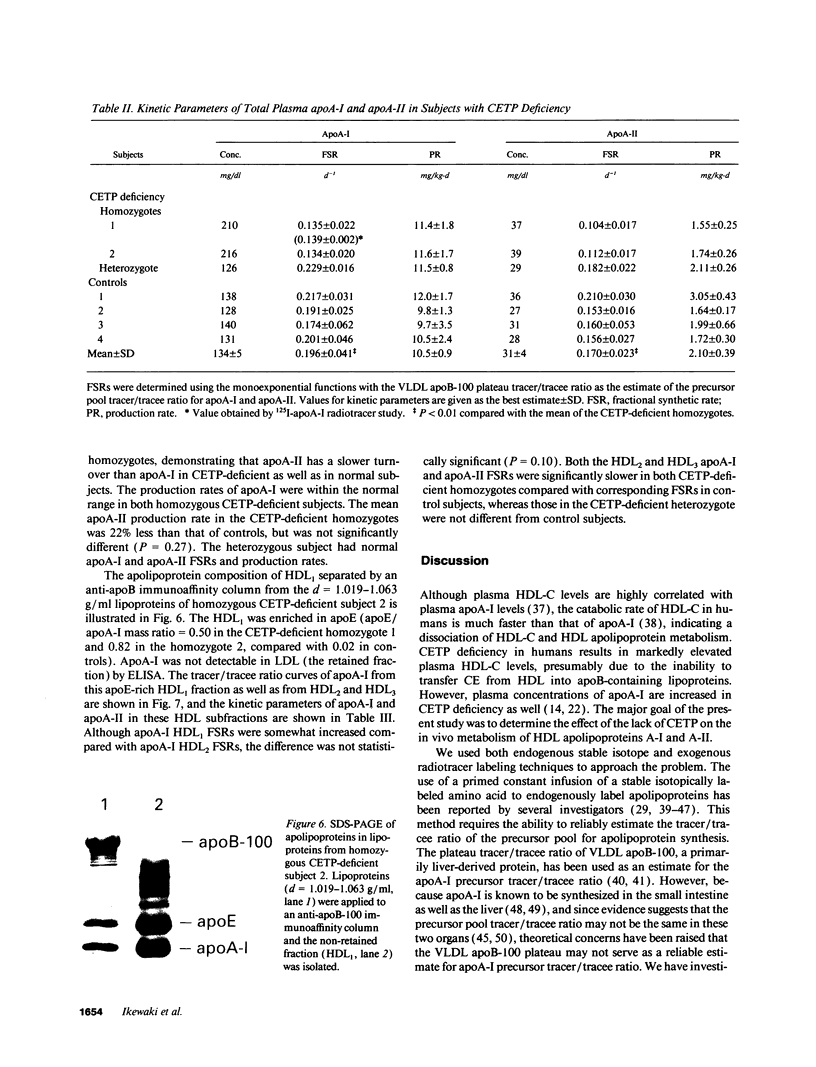
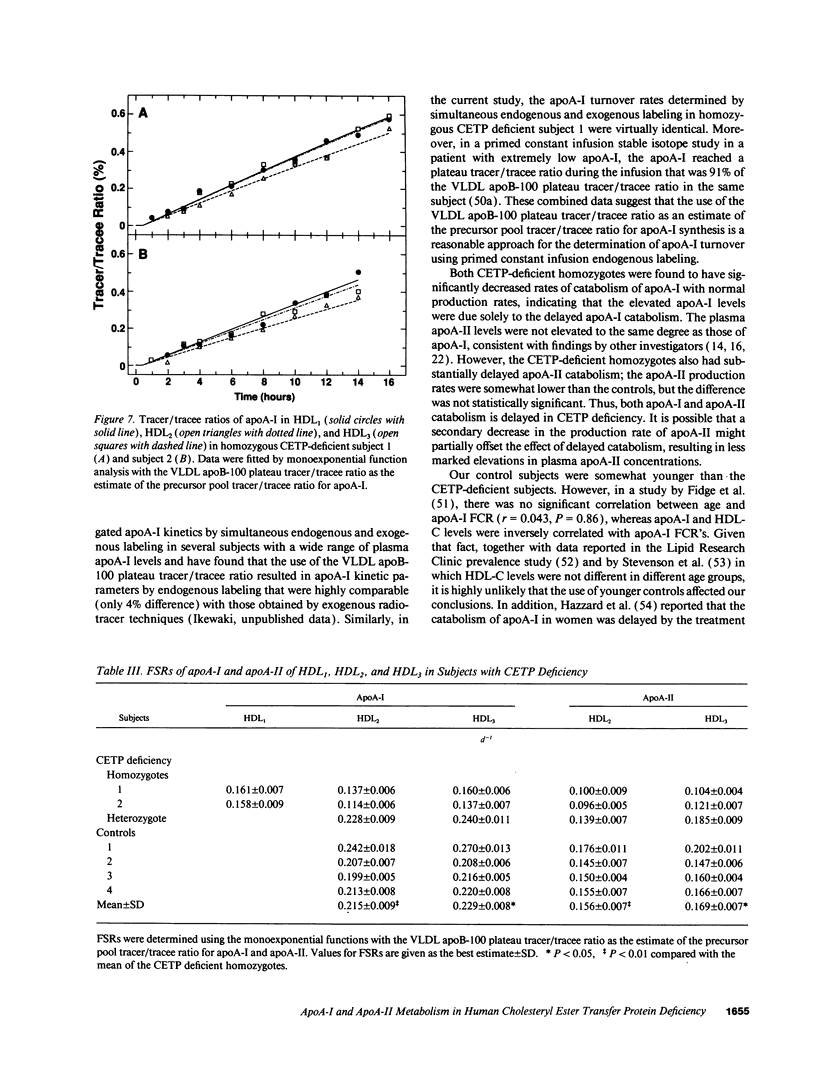
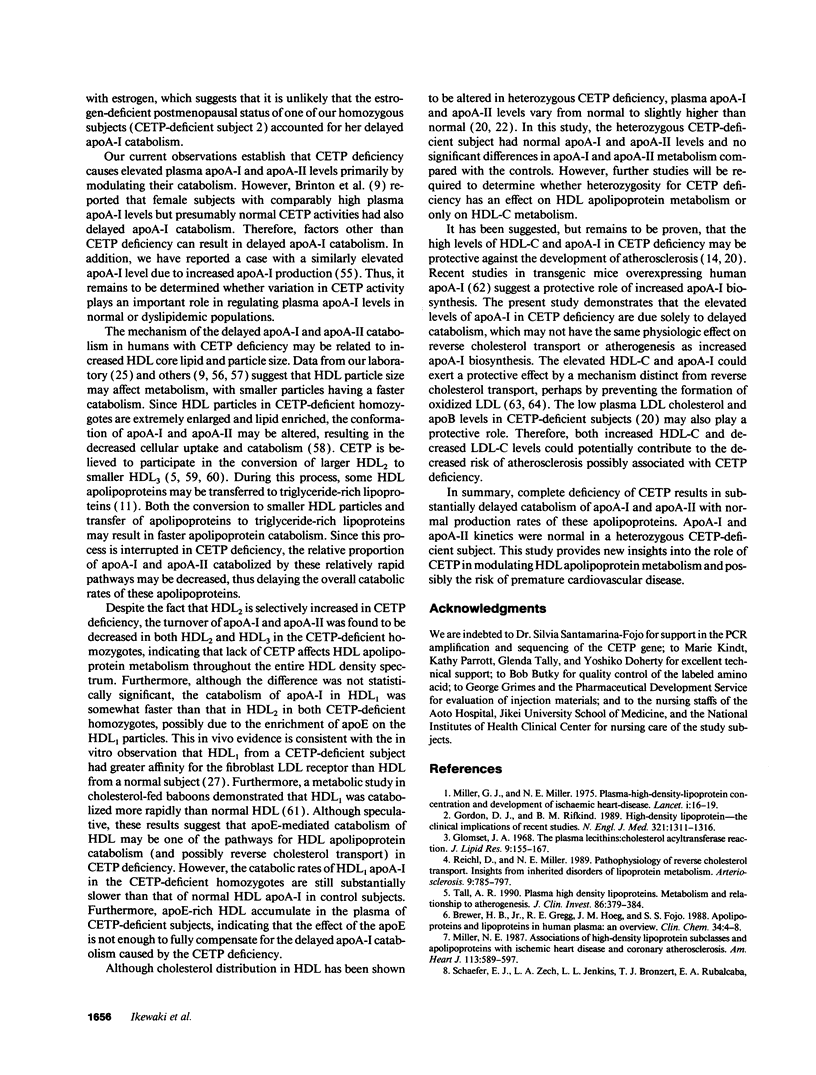
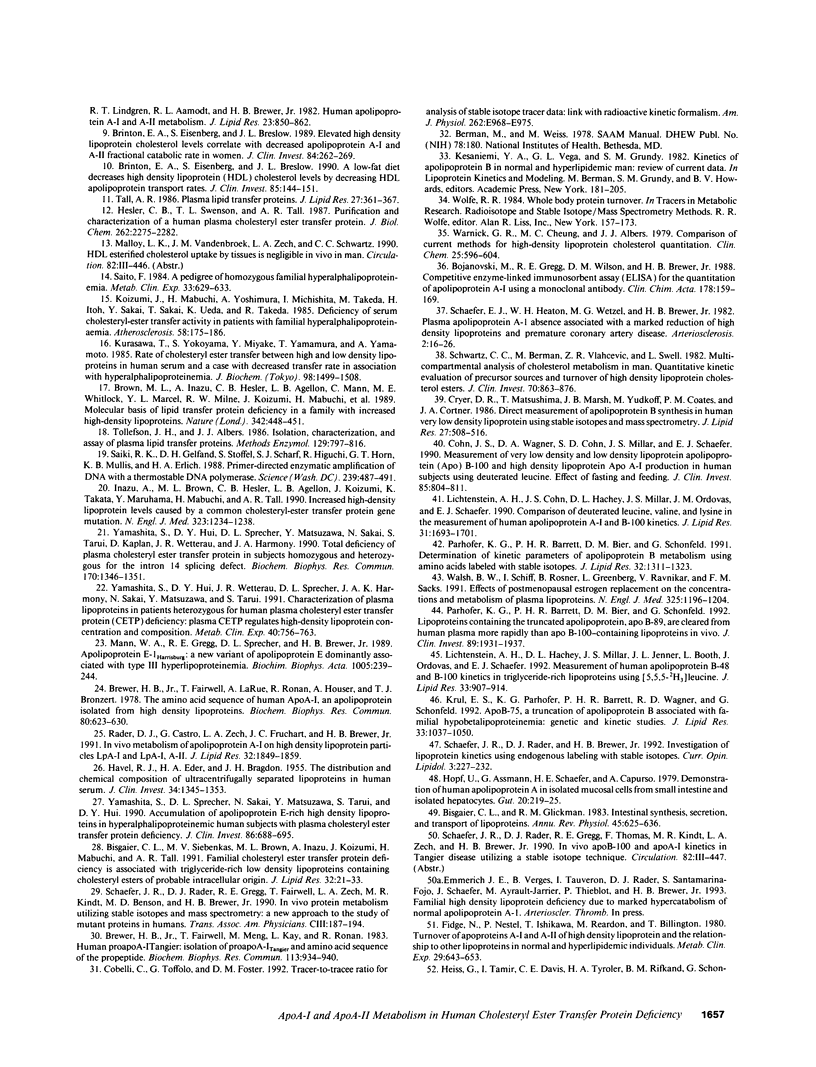
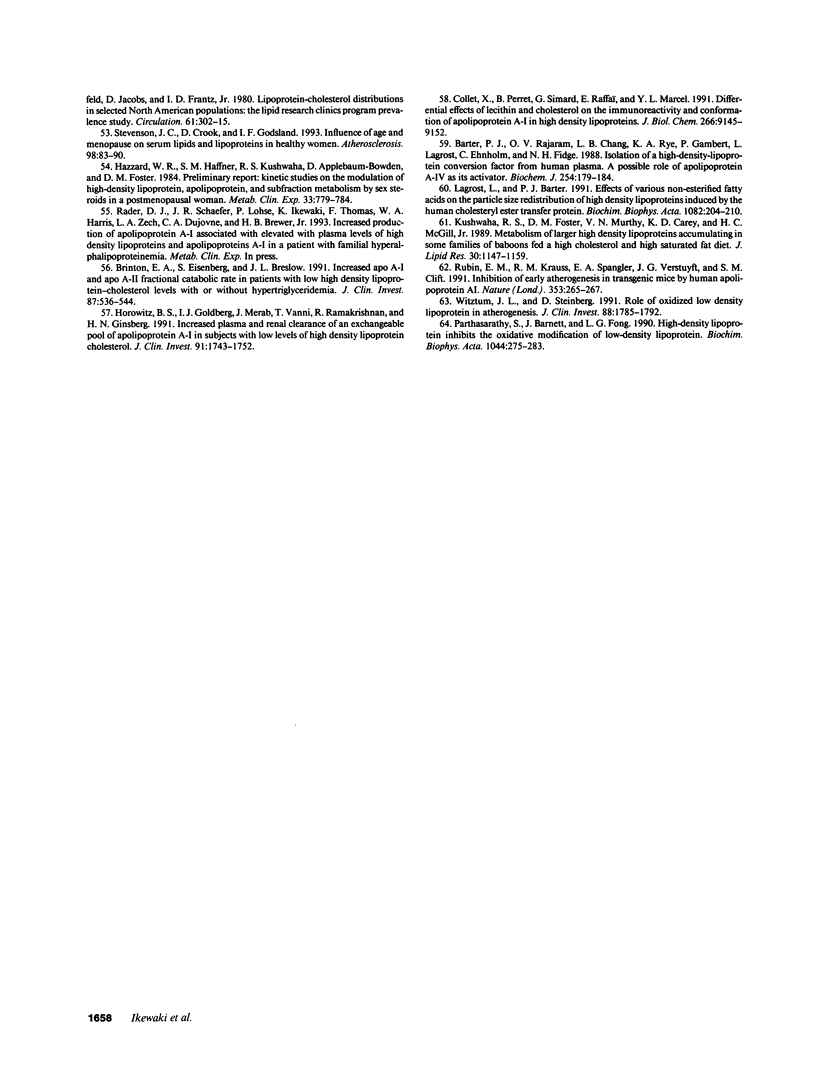
Images in this article
Selected References
These references are in PubMed. This may not be the complete list of references from this article.
- Barter P. J., Rajaram O. V., Chang L. B., Rye K. A., Gambert P., Lagrost L., Ehnholm C., Fidge N. H. Isolation of a high-density-lipoprotein conversion factor from human plasma. A possible role of apolipoprotein A-IV as its activator. Biochem J. 1988 Aug 15;254(1):179–184. doi: 10.1042/bj2540179. [DOI] [PMC free article] [PubMed] [Google Scholar]
- Bisgaier C. L., Glickman R. M. Intestinal synthesis, secretion, and transport of lipoproteins. Annu Rev Physiol. 1983;45:625–636. doi: 10.1146/annurev.ph.45.030183.003205. [DOI] [PubMed] [Google Scholar]
- Bisgaier C. L., Siebenkas M. V., Brown M. L., Inazu A., Koizumi J., Mabuchi H., Tall A. R. Familial cholesteryl ester transfer protein deficiency is associated with triglyceride-rich low density lipoproteins containing cholesteryl esters of probable intracellular origin. J Lipid Res. 1991 Jan;32(1):21–33. [PubMed] [Google Scholar]
- Bojanovski M., Gregg R. E., Wilson D. M., Brewer H. B., Jr Competitive enzyme-linked immunosorbent assay (ELISA) for the quantitation of apolipoprotein A-I using a monoclonal antibody. Clin Chim Acta. 1988 Dec 15;178(2):159–169. doi: 10.1016/0009-8981(88)90222-7. [DOI] [PubMed] [Google Scholar]
- Brewer H. B., Jr, Fairwell T., LaRue A., Ronan R., Houser A., Bronzert T. J. The amino acid sequence of human APOA-I, an apolipoprotein isolated from high density lipoproteins. Biochem Biophys Res Commun. 1978 Feb 14;80(3):623–630. doi: 10.1016/0006-291x(78)91614-5. [DOI] [PubMed] [Google Scholar]
- Brewer H. B., Jr, Fairwell T., Meng M., Kay L., Ronan R. Human proapoA-ITangier: isolation of proapoA-ITangier and amino acid sequence of the propeptide. Biochem Biophys Res Commun. 1983 Jun 29;113(3):934–940. doi: 10.1016/0006-291x(83)91088-4. [DOI] [PubMed] [Google Scholar]
- Brinton E. A., Eisenberg S., Breslow J. L. A low-fat diet decreases high density lipoprotein (HDL) cholesterol levels by decreasing HDL apolipoprotein transport rates. J Clin Invest. 1990 Jan;85(1):144–151. doi: 10.1172/JCI114405. [DOI] [PMC free article] [PubMed] [Google Scholar]
- Brinton E. A., Eisenberg S., Breslow J. L. Elevated high density lipoprotein cholesterol levels correlate with decreased apolipoprotein A-I and A-II fractional catabolic rate in women. J Clin Invest. 1989 Jul;84(1):262–269. doi: 10.1172/JCI114149. [DOI] [PMC free article] [PubMed] [Google Scholar]
- Brinton E. A., Eisenberg S., Breslow J. L. Increased apo A-I and apo A-II fractional catabolic rate in patients with low high density lipoprotein-cholesterol levels with or without hypertriglyceridemia. J Clin Invest. 1991 Feb;87(2):536–544. doi: 10.1172/JCI115028. [DOI] [PMC free article] [PubMed] [Google Scholar]
- Brown M. L., Inazu A., Hesler C. B., Agellon L. B., Mann C., Whitlock M. E., Marcel Y. L., Milne R. W., Koizumi J., Mabuchi H. Molecular basis of lipid transfer protein deficiency in a family with increased high-density lipoproteins. Nature. 1989 Nov 23;342(6248):448–451. doi: 10.1038/342448a0. [DOI] [PubMed] [Google Scholar]
- Cobelli C., Toffolo G., Foster D. M. Tracer-to-tracee ratio for analysis of stable isotope tracer data: link with radioactive kinetic formalism. Am J Physiol. 1992 Jun;262(6 Pt 1):E968–E975. doi: 10.1152/ajpendo.1992.262.6.E968. [DOI] [PubMed] [Google Scholar]
- Cohn J. S., Wagner D. A., Cohn S. D., Millar J. S., Schaefer E. J. Measurement of very low density and low density lipoprotein apolipoprotein (Apo) B-100 and high density lipoprotein Apo A-I production in human subjects using deuterated leucine. Effect of fasting and feeding. J Clin Invest. 1990 Mar;85(3):804–811. doi: 10.1172/JCI114507. [DOI] [PMC free article] [PubMed] [Google Scholar]
- Collet X., Perret B., Simard G., Raffaï E., Marcel Y. L. Differential effects of lecithin and cholesterol on the immunoreactivity and conformation of apolipoprotein A-I in high density lipoproteins. J Biol Chem. 1991 May 15;266(14):9145–9152. [PubMed] [Google Scholar]
- Cryer D. R., Matsushima T., Marsh J. B., Yudkoff M., Coates P. M., Cortner J. A. Direct measurement of apolipoprotein B synthesis in human very low density lipoprotein using stable isotopes and mass spectrometry. J Lipid Res. 1986 May;27(5):508–516. [PubMed] [Google Scholar]
- Fidge N., Nestel P., Ishikawa T., Reardon M., Billington T. Turnover of apoproteins A-I and A-II of high density lipoprotein and the relationship to other lipoproteins in normal and hyperlipidemic individuals. Metabolism. 1980 Jul;29(7):643–653. doi: 10.1016/0026-0495(80)90109-2. [DOI] [PubMed] [Google Scholar]
- Glomset J. A. The plasma lecithins:cholesterol acyltransferase reaction. J Lipid Res. 1968 Mar;9(2):155–167. [PubMed] [Google Scholar]
- Gordon D. J., Rifkind B. M. High-density lipoprotein--the clinical implications of recent studies. N Engl J Med. 1989 Nov 9;321(19):1311–1316. doi: 10.1056/NEJM198911093211907. [DOI] [PubMed] [Google Scholar]
- HAVEL R. J., EDER H. A., BRAGDON J. H. The distribution and chemical composition of ultracentrifugally separated lipoproteins in human serum. J Clin Invest. 1955 Sep;34(9):1345–1353. doi: 10.1172/JCI103182. [DOI] [PMC free article] [PubMed] [Google Scholar]
- Hazzard W. R., Haffner S. M., Kushwaha R. S., Applebaum-Bowden D., Foster D. M. Preliminary report: kinetic studies on the modulation of high-density lipoprotein, apolipoprotein, and subfraction metabolism by sex steroids in a postmenopausal woman. Metabolism. 1984 Sep;33(9):779–784. doi: 10.1016/0026-0495(84)90102-1. [DOI] [PubMed] [Google Scholar]
- Heiss G., Tamir I., Davis C. E., Tyroler H. A., Rifkand B. M., Schonfeld G., Jacobs D., Frantz I. D., Jr Lipoprotein-cholesterol distributions in selected North American populations: the lipid research clinics program prevalence study. Circulation. 1980 Feb;61(2):302–315. doi: 10.1161/01.cir.61.2.302. [DOI] [PubMed] [Google Scholar]
- Hesler C. B., Swenson T. L., Tall A. R. Purification and characterization of a human plasma cholesteryl ester transfer protein. J Biol Chem. 1987 Feb 15;262(5):2275–2282. [PubMed] [Google Scholar]
- Hopf U., Assmann G., Schaefer H. E., Capurso A. Demonstration of human apolipoprotien A in isolated mucosal cells from small intestine and isolated hepatocytes. Gut. 1979 Mar;20(3):219–225. doi: 10.1136/gut.20.3.219. [DOI] [PMC free article] [PubMed] [Google Scholar]
- Horowitz B. S., Goldberg I. J., Merab J., Vanni T. M., Ramakrishnan R., Ginsberg H. N. Increased plasma and renal clearance of an exchangeable pool of apolipoprotein A-I in subjects with low levels of high density lipoprotein cholesterol. J Clin Invest. 1993 Apr;91(4):1743–1752. doi: 10.1172/JCI116384. [DOI] [PMC free article] [PubMed] [Google Scholar]
- Inazu A., Brown M. L., Hesler C. B., Agellon L. B., Koizumi J., Takata K., Maruhama Y., Mabuchi H., Tall A. R. Increased high-density lipoprotein levels caused by a common cholesteryl-ester transfer protein gene mutation. N Engl J Med. 1990 Nov 1;323(18):1234–1238. doi: 10.1056/NEJM199011013231803. [DOI] [PubMed] [Google Scholar]
- Koizumi J., Mabuchi H., Yoshimura A., Michishita I., Takeda M., Itoh H., Sakai Y., Sakai T., Ueda K., Takeda R. Deficiency of serum cholesteryl-ester transfer activity in patients with familial hyperalphalipoproteinaemia. Atherosclerosis. 1985 Dec;58(1-3):175–186. doi: 10.1016/0021-9150(85)90064-4. [DOI] [PubMed] [Google Scholar]
- Krul E. S., Parhofer K. G., Barrett P. H., Wagner R. D., Schonfeld G. ApoB-75, a truncation of apolipoprotein B associated with familial hypobetalipoproteinemia: genetic and kinetic studies. J Lipid Res. 1992 Jul;33(7):1037–1050. [PubMed] [Google Scholar]
- Kurasawa T., Yokoyama S., Miyake Y., Yamamura T., Yamamoto A. Rate of cholesteryl ester transfer between high and low density lipoproteins in human serum and a case with decreased transfer rate in association with hyperalphalipoproteinemia. J Biochem. 1985 Dec;98(6):1499–1508. doi: 10.1093/oxfordjournals.jbchem.a135418. [DOI] [PubMed] [Google Scholar]
- Kushwaha R. S., Foster D. M., Murthy V. N., Carey K. D., McGill H. C., Jr Metabolism of larger high density lipoproteins accumulating in some families of baboons fed a high cholesterol and high saturated fat diet. J Lipid Res. 1989 Aug;30(8):1147–1159. [PubMed] [Google Scholar]
- Lagrost L., Barter P. J. Effects of various non-esterified fatty acids on the particle size redistribution of high density lipoproteins induced by the human cholesteryl ester transfer protein. Biochim Biophys Acta. 1991 Mar 12;1082(2):204–210. doi: 10.1016/0005-2760(91)90195-n. [DOI] [PubMed] [Google Scholar]
- Lichtenstein A. H., Cohn J. S., Hachey D. L., Millar J. S., Ordovas J. M., Schaefer E. J. Comparison of deuterated leucine, valine, and lysine in the measurement of human apolipoprotein A-I and B-100 kinetics. J Lipid Res. 1990 Sep;31(9):1693–1701. [PubMed] [Google Scholar]
- Lichtenstein A. H., Hachey D. L., Millar J. S., Jenner J. L., Booth L., Ordovas J., Schaefer E. J. Measurement of human apolipoprotein B-48 and B-100 kinetics in triglyceride-rich lipoproteins using [5,5,5-2H3]leucine. J Lipid Res. 1992 Jun;33(6):907–914. [PubMed] [Google Scholar]
- Mann W. A., Gregg R. E., Sprecher D. L., Brewer H. B., Jr Apolipoprotein E-1Harrisburg: a new variant of apolipoprotein E dominantly associated with type III hyperlipoproteinemia. Biochim Biophys Acta. 1989 Oct 17;1005(3):239–244. doi: 10.1016/0005-2760(89)90043-x. [DOI] [PubMed] [Google Scholar]
- Miller G. J., Miller N. E. Plasma-high-density-lipoprotein concentration and development of ischaemic heart-disease. Lancet. 1975 Jan 4;1(7897):16–19. doi: 10.1016/s0140-6736(75)92376-4. [DOI] [PubMed] [Google Scholar]
- Miller N. E. Associations of high-density lipoprotein subclasses and apolipoproteins with ischemic heart disease and coronary atherosclerosis. Am Heart J. 1987 Feb;113(2 Pt 2):589–597. doi: 10.1016/0002-8703(87)90638-7. [DOI] [PubMed] [Google Scholar]
- Parhofer K. G., Barrett P. H., Bier D. M., Schonfeld G. Lipoproteins containing the truncated apolipoprotein, Apo B-89, are cleared from human plasma more rapidly than Apo B-100-containing lipoproteins in vivo. J Clin Invest. 1992 Jun;89(6):1931–1937. doi: 10.1172/JCI115799. [DOI] [PMC free article] [PubMed] [Google Scholar]
- Parhofer K. G., Hugh P., Barrett R., Bier D. M., Schonfeld G. Determination of kinetic parameters of apolipoprotein B metabolism using amino acids labeled with stable isotopes. J Lipid Res. 1991 Aug;32(8):1311–1323. [PubMed] [Google Scholar]
- Parthasarathy S., Barnett J., Fong L. G. High-density lipoprotein inhibits the oxidative modification of low-density lipoprotein. Biochim Biophys Acta. 1990 May 22;1044(2):275–283. doi: 10.1016/0005-2760(90)90314-n. [DOI] [PubMed] [Google Scholar]
- Rader D. J., Castro G., Zech L. A., Fruchart J. C., Brewer H. B., Jr In vivo metabolism of apolipoprotein A-I on high density lipoprotein particles LpA-I and LpA-I,A-II. J Lipid Res. 1991 Nov;32(11):1849–1859. [PubMed] [Google Scholar]
- Reichl D., Miller N. E. Pathophysiology of reverse cholesterol transport. Insights from inherited disorders of lipoprotein metabolism. Arteriosclerosis. 1989 Nov-Dec;9(6):785–797. doi: 10.1161/01.atv.9.6.785. [DOI] [PubMed] [Google Scholar]
- Rubin E. M., Krauss R. M., Spangler E. A., Verstuyft J. G., Clift S. M. Inhibition of early atherogenesis in transgenic mice by human apolipoprotein AI. Nature. 1991 Sep 19;353(6341):265–267. doi: 10.1038/353265a0. [DOI] [PubMed] [Google Scholar]
- Saiki R. K., Gelfand D. H., Stoffel S., Scharf S. J., Higuchi R., Horn G. T., Mullis K. B., Erlich H. A. Primer-directed enzymatic amplification of DNA with a thermostable DNA polymerase. Science. 1988 Jan 29;239(4839):487–491. doi: 10.1126/science.2448875. [DOI] [PubMed] [Google Scholar]
- Saito F. A pedigree of homozygous familial hyperalphalipoproteinemia. Metabolism. 1984 Jul;33(7):629–633. doi: 10.1016/0026-0495(84)90061-1. [DOI] [PubMed] [Google Scholar]
- Schaefer E. J., Heaton W. H., Wetzel M. G., Brewer H. B., Jr Plasma apolipoprotein A-1 absence associated with a marked reduction of high density lipoproteins and premature coronary artery disease. Arteriosclerosis. 1982 Jan-Feb;2(1):16–26. doi: 10.1161/01.atv.2.1.16. [DOI] [PubMed] [Google Scholar]
- Schaefer E. J., Zech L. A., Jenkins L. L., Bronzert T. J., Rubalcaba E. A., Lindgren F. T., Aamodt R. L., Brewer H. B., Jr Human apolipoprotein A-I and A-II metabolism. J Lipid Res. 1982 Aug;23(6):850–862. [PubMed] [Google Scholar]
- Schaeffer J. R., Rader D. J., Gregg R. E., Fairwell T., Zech L. A., Kindt M. R., Benson M. D., Brewer H. B., Jr In vivo protein metabolism utilizing stable isotopes and mass spectrometry: a new approach to the study of mutant proteins in humans. Trans Assoc Am Physicians. 1990;103:187–194. [PubMed] [Google Scholar]
- Schwartz C. C., Berman M., Vlahcevic Z. R., Swell L. Multicompartmental analysis of cholesterol metabolism in man. Quantitative kinetic evaluation of precursor sources and turnover of high density lipoprotein cholesterol esters. J Clin Invest. 1982 Oct;70(4):863–876. doi: 10.1172/JCI110683. [DOI] [PMC free article] [PubMed] [Google Scholar]
- Stevenson J. C., Crook D., Godsland I. F. Influence of age and menopause on serum lipids and lipoproteins in healthy women. Atherosclerosis. 1993 Jan 4;98(1):83–90. doi: 10.1016/0021-9150(93)90225-j. [DOI] [PubMed] [Google Scholar]
- Tall A. R. Plasma high density lipoproteins. Metabolism and relationship to atherogenesis. J Clin Invest. 1990 Aug;86(2):379–384. doi: 10.1172/JCI114722. [DOI] [PMC free article] [PubMed] [Google Scholar]
- Tall A. R. Plasma lipid transfer proteins. J Lipid Res. 1986 Apr;27(4):361–367. [PubMed] [Google Scholar]
- Tollefson J. H., Albers J. J. Isolation, characterization, and assay of plasma lipid transfer proteins. Methods Enzymol. 1986;129:797–816. doi: 10.1016/0076-6879(86)29106-5. [DOI] [PubMed] [Google Scholar]
- Walsh B. W., Schiff I., Rosner B., Greenberg L., Ravnikar V., Sacks F. M. Effects of postmenopausal estrogen replacement on the concentrations and metabolism of plasma lipoproteins. N Engl J Med. 1991 Oct 24;325(17):1196–1204. doi: 10.1056/NEJM199110243251702. [DOI] [PubMed] [Google Scholar]
- Warnick G. R., Cheung M. C., Albers J. J. Comparison of current methods for high-density lipoprotein cholesterol quantitation. Clin Chem. 1979 Apr;25(4):596–604. [PubMed] [Google Scholar]
- Witztum J. L., Steinberg D. Role of oxidized low density lipoprotein in atherogenesis. J Clin Invest. 1991 Dec;88(6):1785–1792. doi: 10.1172/JCI115499. [DOI] [PMC free article] [PubMed] [Google Scholar]
- Yamashita S., Hui D. Y., Sprecher D. L., Matsuzawa Y., Sakai N., Tarui S., Kaplan D., Wetterau J. R., Harmony J. A. Total deficiency of plasma cholesteryl ester transfer protein in subjects homozygous and heterozygous for the intron 14 splicing defect. Biochem Biophys Res Commun. 1990 Aug 16;170(3):1346–1351. doi: 10.1016/0006-291x(90)90542-u. [DOI] [PubMed] [Google Scholar]
- Yamashita S., Hui D. Y., Wetterau J. R., Sprecher D. L., Harmony J. A., Sakai N., Matsuzawa Y., Tarui S. Characterization of plasma lipoproteins in patients heterozygous for human plasma cholesteryl ester transfer protein (CETP) deficiency: plasma CETP regulates high-density lipoprotein concentration and composition. Metabolism. 1991 Jul;40(7):756–763. doi: 10.1016/0026-0495(91)90097-g. [DOI] [PubMed] [Google Scholar]
- Yamashita S., Sprecher D. L., Sakai N., Matsuzawa Y., Tarui S., Hui D. Y. Accumulation of apolipoprotein E-rich high density lipoproteins in hyperalphalipoproteinemic human subjects with plasma cholesteryl ester transfer protein deficiency. J Clin Invest. 1990 Sep;86(3):688–695. doi: 10.1172/JCI114764. [DOI] [PMC free article] [PubMed] [Google Scholar]





